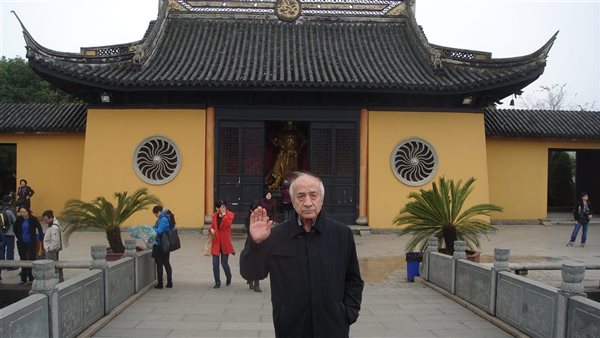Renowned Syrian thinker and scholar Firas Al-Sawah has made bold statements regarding the evolving political landscape in Syria, arguing that Prophet Muhammad was the first historical figure to separate religion from the state. In an exclusive interview with Harf, a cultural outlet, Al-Sawah assessed the current situation in Syria following the unexpected rise to power of Ahmad al-Sharaa, the leader of Hay’at Tahrir al-Sham (HTS), and discussed the implications of this transition on the country’s future.
A New Chapter in Syria’s History
The takeover of Damascus by Ahmad al-Sharaa, formerly known as Abu Muhammad al-Golani, has triggered widespread debate about Syria’s trajectory. Al-Sawah compared this event to a “new declaration of independence” for Syria, emphasizing that even the worst alternative would be preferable to the Assad regime, which had ruled with an iron grip for over five decades.
Initially, Al-Sharaa’s offensive—dubbed “Repelling Aggression”—was aimed at capturing Aleppo to pressure Bashar al-Assad into complying with the Arab League’s directives and implementing UN Resolution 2254. However, the swift collapse of the Syrian army’s resistance resulted in Al-Sharaa’s unplanned ascension to power in Damascus.
HTS: A Product of the Revolution, Not a Foreign Entity
Responding to concerns over HTS’s governance, Al-Sawah dismissed claims that the group was a foreign creation. He described HTS as an organic product of the 2011 Syrian revolution, which later established its authority in Idlib and successfully managed the region. He attributed the group’s endurance and efficiency to its leader, Ahmad al-Sharaa, whom he characterized as an intelligent and charismatic figure, comparable to the late Egyptian president Gamal Abdel Nasser.
“HTS is now the de facto authority, and Syrians have only two choices,” Al-Sawah stated. “Either they accept this new reality, or they allow Iran, Hezbollah, and remnants of the Assad regime to drag the country back into tyranny.”
From Jihadist to Political Leader?
One of the most contentious issues surrounding Ahmad al-Sharaa is his ideological transformation. Once the leader of a jihadist faction, he now presents himself as a pragmatic political leader committed to governance and state-building. Al-Sawah believes that jihadist ideology was a temporary necessity for Al-Sharaa and others seeking an alternative to the failed Baathist model.
Now, with the collapse of the Assad regime, Al-Sharaa appears to be pivoting toward a more political and diplomatic approach. He has pledged to hold a national dialogue conference, form a transitional government representing all Syrians, conduct internationally supervised elections, draft a new constitution, and even dissolve HTS altogether.
“We have placed our trust in him,” Al-Sawah said, “but we will also monitor his actions and hold him accountable when necessary.”
The Fate of Political Islam in Syria
Al-Sawah firmly believes that “political Islam” no longer has the ability to establish a religious state. He pointed to the failure of ISIS and the Muslim Brotherhood’s experience in Egypt as evidence that such models are doomed to collapse. Instead, he suggested that the only viable path for Islamist groups is to transition into democratic political parties, much like Turkey’s Justice and Development Party (AKP).
He added that the world would not tolerate the establishment of another so-called “Islamic state,” making it necessary for HTS to evolve into a political entity rather than an armed faction.
Was There Ever an Islamic Caliphate?
One of Al-Sawah’s most striking claims in the interview was his assertion that an Islamic Caliphate never truly existed. He argued that Prophet Muhammad himself was a secular leader who separated religion from the state through the Constitution of Medina, which established legal and political structures for Muslims, Christians, and pagans alike.
“The Prophet ruled Medina as a political leader, not as a religious figure,” Al-Sawah explained. “Even his military campaigns were more about diplomacy and governance than religious conquest.”
According to Al-Sawah, the first real attempt at an Islamic state was Iran’s 1979 revolution under Ayatollah Khomeini, which, in his view, presented the worst possible model of Islamic governance.
Syria’s Future: A Civil War or a Political Transition?
Looking ahead, Al-Sawah remains optimistic that Syria will not descend into a full-scale civil war, despite ongoing tensions. While various ethnic and religious groups have historically coexisted, he noted that Kurdish factions—particularly the Syrian Democratic Forces (SDF)—are the only ones actively pushing for federalism.
He warned that if Kurdish forces refuse to integrate into the new Syrian army, there could be further conflict. However, he dismissed the idea of a prolonged civil war, arguing that the new leadership in Damascus has the momentum to consolidate power.
Addressing Human Rights Concerns
Asked about reports of extrajudicial killings and kidnappings allegedly committed by HTS-affiliated factions, Al-Sawah acknowledged the concerns but insisted that mistakes are inevitable during times of transition. He stated that such incidents were being monitored and reported to leadership, which, he claimed, is taking steps to prevent further violations.
“Syria is now at the centre of global attention,” he concluded. “Ahmad al-Sharaa is focused on winning international legitimacy, and that means prioritizing diplomacy and governance over military rule.”
With just two months since Assad’s departure, the road ahead remains uncertain. However, Al-Sawah’s assessment suggests that Syria’s new leadership, whether welcomed or controversial, is determined to chart a different course from the past five decades of authoritarian rule.
This article was translated and edited by The Syrian Observer. The Syrian Observer has not verified the content of this story. Responsibility for the information and views set out in this article lies entirely with the author.


